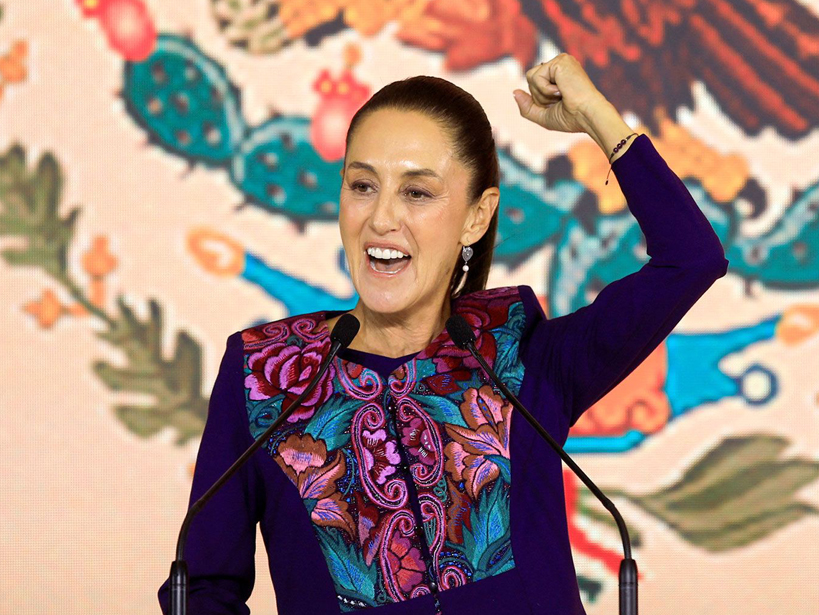Mexico’s recent presidential election represented a pivotal moment as Claudia Sheinbaum was elected as the nation’s first female president, taking over from Andrés Manuel López Obrador (AMLO). This change in leadership is likely to bring about considerable shifts in policy, especially in key industries such as mining, which is crucial to Mexico’s economy. President Sheinbaum’s stance on open-pit mining marks a departure from the strategies of her predecessor, raising important considerations for both domestic and international investors.
During AMLO’s administration, several reforms were enacted to enhance state control over the mining industry. A key proposal was the ban on open-pit mining, which raised alarm among miners and investors alike. Although the proposed ban on open-pit mining remained a contentious issue throughout his presidency, it did not come to fruition before he left office. Instead, new permits were effectively frozen, particularly for foreign companies, leading to an environment of regulatory uncertainty.
Additionally, AMLO’s administration canceled lithium concessions and launched a state-owned lithium mining operation, significantly limiting private investment opportunities. A key element of Sheinbaum’s mining policy is her dedication to increasing the extraction of essential minerals such as lithium and copper, which are crucial for producing electric vehicles and other technologies integral to the global clean energy transition. Throughout her campaign, she underscored the importance of Mexico’s lithium reserves in Sonora and advocated for the adoption of innovative extraction technologies. The nationalization of lithium resources in 2022 represented a major change in Mexico’s strategy regarding critical minerals. This policy is designed to ensure sustainable management of these resources while bolstering domestic industries. With global demand for these minerals on the rise, Mexico’s abundant deposits could become a vital component of international supply chains.
In stark contrast to her predecessor, President Sheinbaum has adopted a more measured stance regarding open-pit mining. In her inaugural address on October 1, 2024, she unveiled a comprehensive 100-point program addressing various national challenges, including energy transition and labor law reforms. Notably absent from her agenda was any mention of banning open-pit mining, a policy that had seemed imminent during AMLO’s final months in office. This omission has generated optimism among industry stakeholders who believe Sheinbaum may pursue a more pragmatic regulatory approach towards Mexico’s critical mineral resources sector.
Despite these positive indicators regarding open-pit mining regulations, environmental concerns remain paramount in shaping Mexico’s mining landscape. Regulatory uncertainties linger due to ongoing legal challenges surrounding AMLO’s mining reforms. Over 500 constitutional challenges have been filed against these laws, which could significantly influence future legislative actions affecting miners. Moreover, water management remains critical given Mexico’s severe water crisis. To address this, Sheinbaum has proposed measures to improve water infrastructure and promote wastewater reuse, strategies that could alleviate constraints faced by mines operating within sensitive ecosystems.
Another factor influencing Sheinbaum’s likely softer stance on open-pit mining is Mexico’s growing role in nearshoring, where international companies, particularly from the United States, relocate their manufacturing closer to home. This trend has been accelerated by global supply chain disruptions and the need for more reliable production hubs. Mining is a crucial component of this process, as metals like copper, silver, and lithium are essential for the production of electronics, batteries, and other goods.
Mexico has become a major player in nearshoring, and the mining sector plays a critical role in supplying the materials needed for this industrial shift. With Sheinbaum’s government poised to benefit from this economic opportunity, a hardline stance on open-pit mining could undermine efforts to position Mexico as a key player in global supply chains, particularly in industries like electric vehicles and renewable energy technology.
In fact, Mexico recently surpassed China as the largest exporter to the United States, driven largely by nearshoring. This shift has brought newfound attention to Mexico’s natural resources, and Sheinbaum’s government will need to carefully navigate these economic demands while addressing domestic and international environmental concerns.
Sheinbaum’s apparent shift away from a potential ban has already sparked optimism within the mining industry. Mexican mining stocks, which had been trading with caution due to fears of stricter regulations, are now showing signs of recovery. Analysts believe that a more lenient stance on open-pit mining could boost investment and encourage growth in a sector that contributes significantly to Mexico’s GDP.
Industry experts are hopeful about the prospects under Sheinbaum’s leadership. As reported in the Deep Dive, Glenn Jessum, CEO of Silver Tiger Metals, a developer in Mexico’s mining industry, expressed confidence in the evolving climate for investment under her administration, highlighting that previous hurdles in securing permits had significantly hampered investment. While Sheinbaum aligns with many leftist policies akin to those championed by AMLO, she appears more technocratic than populist, suggesting a willingness to engage in constructive dialogue with stakeholders in the mining sector.
As President Sheinbaum settles into her role, the coming months will be critical in determining the direction of Mexico’s mining policies. Her background as a climate scientist suggests that while she may maintain strict environmental standards for mining operations, her inclination towards dialogue and data-driven decision-making could lead to a more balanced approach that considers both environmental concerns and the economic significance of the mining sector.
The Mexican mining industry stands at a crossroads; with an administration more receptive to dialogue and investment opportunities on the horizon, stakeholders are hopeful for a revival in exploration and development activities that align with sustainable practices. The balance between economic growth and environmental stewardship will be key as Sheinbaum navigates this complex landscape in her presidency.
Read Part Two – Canadian Investment in Mexico’s Mining Sector, Navigating Opportunities and Challenges, which will be posted tomorrow.

